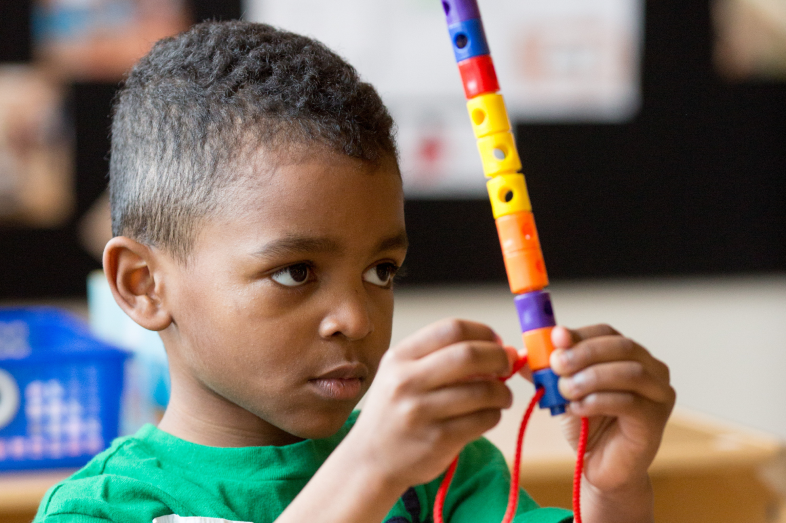Less than a month after Texas enacted a law banning race-based hair discrimination in housing, employment and schools, a 17-year-old student was suspended for weeks and will be sent to an alternative school because of his hairstyle.
Administrators at Barbers Hill High School, located in Mont Belvieu, a town over 30 miles from Houston, say Darryl George’s locs, which he wears braided, violate the Barbers Hill Independent School District’s dress code for male students. School officials have asked George to cut his hair. His family has filed a federal civil rights lawsuit.
Disciplinary actions that result in suspensions are among the many threats to Black academic achievement in American schools, and they have gone underreported, said Tyrone C. Howard, UCLA education professor and American Educational Research Association president.
“We have not written or talked enough about the ways in which schools have become very hostile to Black students – not peer to peer, but adult to peer,” Howard said, citing research from the UCLA Center for Civil Right Remedies. He spoke during an Education Writers Association session at the 2023 National Association of Black Journalists convention in Birmingham, Alabama last August.
In fact, a 2019 study by Princeton University found that Black students receive discipline at almost four times the rate as white students. And in its research, the Brookings Institute found that when it comes to school suspensions among Black students, 70% are for discretionary reasons, such as dress code or long hair violations – neither of which have been found to be predictive of student misconduct, the District of Columbia-based think tank explained.
In other states, the accusation of an infraction combined with the perception that a student “talked back” to an authority figure could be interpreted as “willful defiance,” according to Howard. His research shows that many school districts have cited this as a valid reason for suspending and expelling students of color.
George’s story first made headlines in September – after Howard spoke to EWA and NABJ journalists. In the session, Howard focused on legislative efforts and education issues that are disproportionately threatening Black and brown students, and he offered advice to help journalists find underreported stories. When addressing education issues, he believes the work of scholars and reporters can be done in a collaborative manner, he said.
Get insights from Howard in this explainer. Listen to the audio to learn about all issues (and joys) Howard believes reporters should be watching.
Student Discipline Starts in Preschool
The rates at which Black students, particularly boys, are being suspended from school have gone underreported in California and throughout the country, Howard said.
“What we have to do is do a deeper dive on not just the large urban comprehensive districts, but those rural communities and even the suburban communities where Black students are in smaller numbers because they face even the higher levels of scrutiny when it comes to school punishment,” he explained.
Further unsettling and in need of greater examination, Howard said, is the age at which some school districts start removing students from class.
Black preschool students accounted for just 18.2% of the total preschool enrollment in the 2017 academic year, yet they received 43.3% of one or more out-of-school suspensions, according to a U.S. Department of Education June 2021 overview of school discipline. This report also found that Black preschool students were expelled at twice their share of the student body.
“Here’s the thing: You label me as a problem at 3 or 4 years old. You talk to me like I’m a problem. At some point in time, what do I think of myself as – a problem,” Howard said. “We have to begin to look at the self-fulfilling prophecy of what it means to have so many of our young babies being labeled as problems at such an early age.”
How School Punishments Affect Children’s Opportunities
Suspensions for arbitrary reasons are having a negative impact on the academic future for Black students, Howard and other experts say. “The data tells us that any child that has been suspended – they have about a 20% less likelihood that they will graduate from high school,” he said.
Such punishments create a school-to-prison pipeline. Students who attend a school with higher suspension rates are 15% to 20% more likely to be arrested and incarcerated as adults, the National Bureau of Economic Research said in a 2019 paper.
As nearly 33 million students return to U.S. public elementary schools, Howard challenged journalists to cover these underreported stories of school suspensions and expulsions along with several other recurring issues that may impede progress toward equity in public education for Black and brown students.
Legislative Efforts to Restrict What Can Be Taught and Read in Schools
For the past two school years, the graduate-level academic framework “critical race theory” has been weaponized as an umbrella term for race-related topics, capturing headlines as politicians, parents, teachers and administrators attend fiery school board meetings debating what parts of American history should be taught to students. These debates may have disappeared from some news sound bites, but the effort to restrict some parts of American history continues.
From July 2021 to June 2022, 1,648 books have been banned from public schools and libraries, according to PEN America. Bans occurred in 138 school districts in 32 states, which represent 5,049 schools and 4 million students.
“What we see here is a removal of content, alteration of curriculum that begins to address the historical challenges faced by folks of color,” Howard said.
PEN America says that 1,109 bans are connected either to proposed or enacted legislation, or to political pressure from state officials or elected lawmakers to restrict the teaching or presence of certain books or concepts.
Of the titles in its index of banned books, 659 titles contain protagonists or prominent secondary characters of color, and 338 titles directly address issues of race and racism.
“In particular, most of this data looks specifically [at] Black authors, to Toni Morrison, to Alice Walker, [to] bell hooks – folks who have gone down as literary geniuses in our world,” Howard said.
In 2021, the Central York School District removed “Teaching to Transgress: Education as the Practice of Freedom,” by bell hooks, from its classrooms, as shown in PEN America’s Index of School Book Bans. During the past year, several school districts have banned Toni Morrison’s “Beloved” and “The Bluest Eye” from classrooms and libraries.
Why Students May ‘Check Out’ of Colleges Mentally and Physically
Howard also encouraged journalists to continue engaging their audiences on the fallout to this summer’s U.S. Supreme Court ruling on race-conscious college admissions that is expected to change how institutions consider diversity as they invite students to become part of their student body.
Over the next several years there may be a significant drop off in the number of Black and brown students on college campuses and universities, he said.
“As we continue to change the ways in which we see opportunity being provided to certain subgroups, banning of books, elimination of content, watering down of race-specific and African American specific content,” Howard said, “I think what you see is a lot of young people beginning to check out – to say that this space is not for me; it doesn’t value me; it doesn’t validate me. ‘Why do I keep coming to a place that tells me it doesn’t want me here?’”


